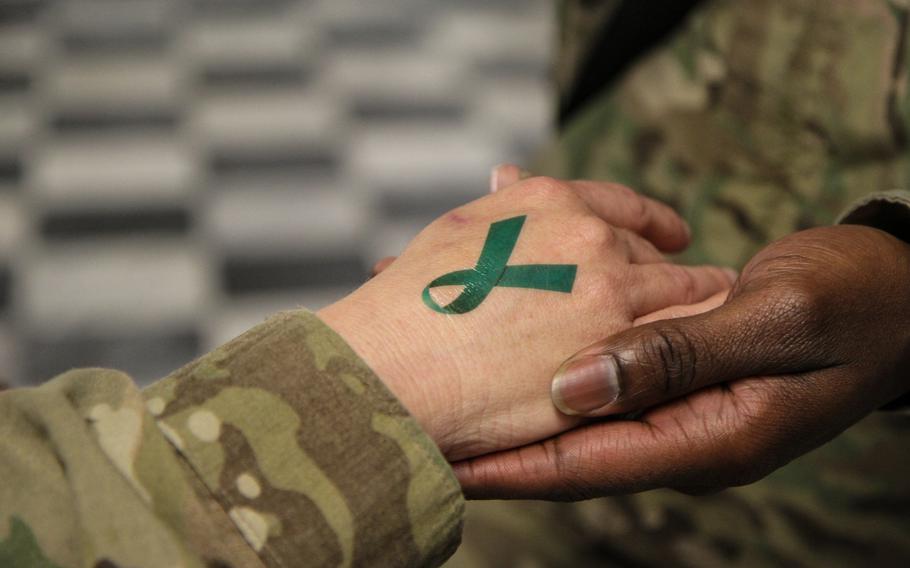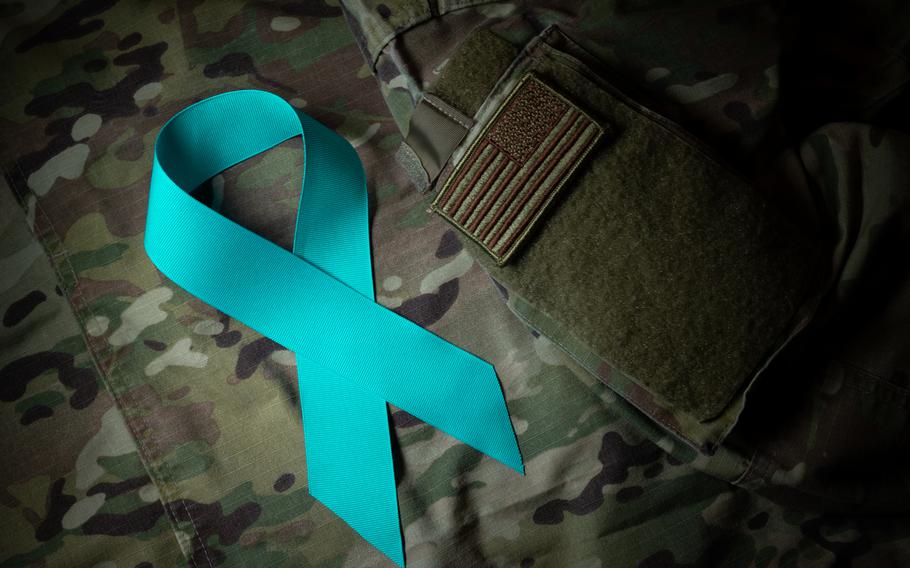
A soldier places a teal ribbon temporary tattoo on another soldier's hand. The teal ribbon is the symbol of sexual assault survivors and awareness. A new Government Accountability Office report found that the Defense Department needs to do a better job addressing the needs of service members who are victims of sexual assault, sexual harassment and domestic sexual abuse. (Kelly Simon/U.S. Army)
The military should improve its handling of the needs of service members who are victims of sexual assault, sexual harassment and domestic sexual abuse, the Government Accountability Office recommended in a new report.
Personnel who experience sexual trauma may develop chronic mental health conditions and are more likely to leave the military, making recruitment and retention challenges more severe, the watchdog agency said in a report released Wednesday.
As a result, the Pentagon needs to shore up patient confidentiality and privacy as well as access to care for victims of sexual trauma, the GAO concluded.
Unwanted sexual behavior is an umbrella term referring to sexual harassment, sexual assault and domestic sexual abuse that occurs during military service.
The GAO conducted its audit from August 2021 to August 2023 after Congress asked the agency to review the state of behavioral health in the military and service members’ experiences with unwanted sexual behavior.
Data reviewed by the agency from fiscal years 2015 through 2021 showed that more than 350,000 veterans and service members screened positive for trauma related to experiences with unwanted sexual behavior.
Requiring referrals for long-term care and failing to prioritize behavioral care appointments for service members who disclose sexual assaults remain barriers to treatment, the GAO found.
Although confidential counseling is available at VA centers, longer-term behavioral health care still requires a referral from a military provider, and that may be a deterrent, according to the report, which contains more than a dozen recommendations.

The teal ribbon is a national symbol of support for sexual assault victims. The Defense Department should do a better job addressing the needs of service members who are victims of sexual assault, sexual harassment and domestic sexual abuse, the Government Accountability Office concluded in a new report. (Donald Hudson/U.S. Air Force)
For example, the Pentagon should consider whether access to VA care could be granted without a referral for some service members, such as those for whom disclosure is not necessary to minimize mission risks.
The Defense Department concurred and said it will look at ways to improve access to care and reduce the stigma for sexual assault victims.
The GAO also recommended the military clarify how and when medical care should be prioritized for victims of unwanted sexual behavior and how providers should screen for potential victims.
None of the 18 military providers in the report knew of guidance requiring them to prioritize already hard-to-get appointments for behavioral health. Wait times for appointments can be up to four months unless a patient is suicidal, providers said.
Reviewing separation data, the GAO found service members who had reported unwanted sexual behavior left the military “at substantially higher rates than the overall active-duty population.”
Separation rates from active-duty service for those reporting sexual trauma ranged from 37% in the Air Force to 60% in the Marine Corps, compared with just 12% of the active-duty population at large in the military during the six-year review period, the report said.
The Pentagon does not know the extent to which unwanted sexual behavior may have factored into those separation decisions, the GAO found.
More than 350 codes describe the basis for separation from the military, but a Pentagon official told the GAO that developing a designation for separations connected to unwanted sexual behavior hasn’t been considered.
Without this information, victims may not qualify for related medical exams and higher-level reviews of involuntary separations, factors that may affect their eligibility for veterans benefits, the report said.
In addition, the report raised concerns about confidentiality regarding Military Health System Genesis, the Pentagon’s new electronic health record.
A primary care provider said because of such concerns, some facilities rely on paper charts in reported sexual assault cases, according to the GAO.